Screening of Lynch syndrome
Screening of Lynch syndrome


Microsatellites are short tandem repeats throughout the human genome. Compared with normal tissue, the length of microsatellites in tumor tissue is changed due to the insertion or deletion of repeating units, which is called microsatellite instability (MSI). A large number of studies have shown that MSI is caused by a defect to the occurrence of tumors.

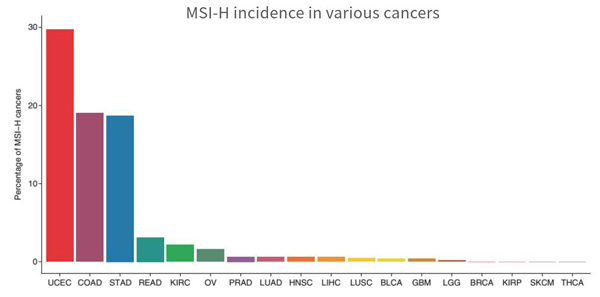
NCCN, ASCO, ESMO, CSCO, "Chinese Expert Consensus on Molecular Markers of Colorectal Cancer" and other guidelines jointly recommend that microsatellite instability detection is widely used in the screening of Lynch syndrome, the judgment of cancer prognosis, the prediction of the efficacy of adjuvant chemotherapy and the Immunotherapy Guidelines.

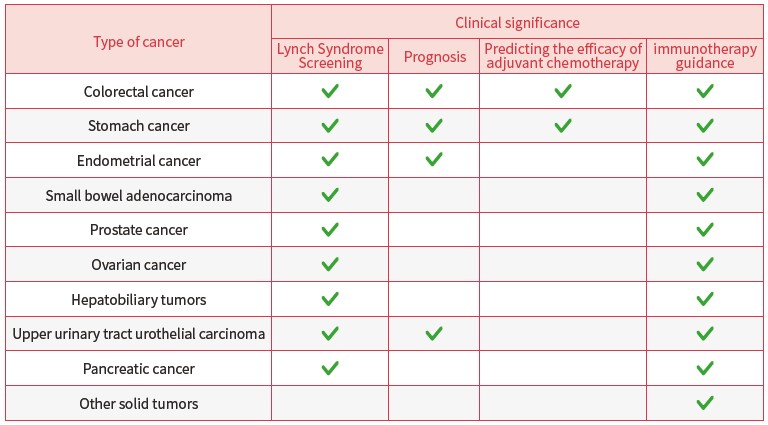
Lynch syndrome, formerly known as hereditary non-polyposis colorectal cancer (HNPCC), is an autosomal dominant genetic tumor syndrome in which patients suffer from colorectal cancer or other multiple The risk of malignant tumors in various parts (including endometrium, ovary, stomach, small intestine, liver and gallbladder, upper urinary tract, brain and skin) was significantly increased.
More than 90% of Lynch syndrome have MSI features, while only about 15% of sporadic colon cancer, therefore, MSI detection can be clinically used to screen for Lynch syndrome.
At present, there is a large amount of evidence that MSI-H is a marker of good prognosis in patients with stage II colorectal cancer.
The 5-year survival rate of MSI-H stage II colorectal cancer patients is significantly higher than that of MSI-L/MSS, and the risk of recurrence is lower[3].
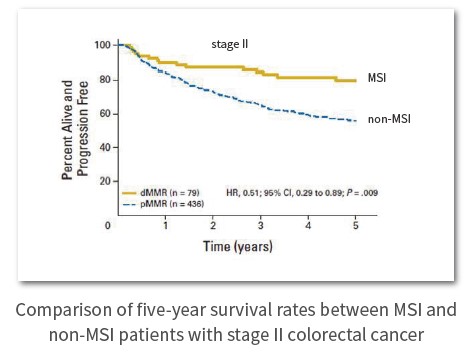
According to the Asian Cancer Research Group (ACRG) molecular classification of gastric cancer in 2015, MSI-H gastric cancer has the best prognosis.
In 2020, the research team from Wang Qiang et al. [4], based on the research data of the Chinese population, showed that regardless of ACRG or TCGA classification, MSI-H/dMMR gastric cancer patients had the best prognosis. Most other domestic and foreign studies have suggested that MSI-H is a good predictor of prognosis in resectable gastric cancer.
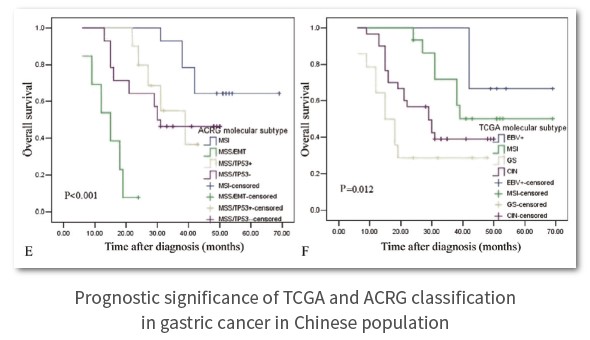
In 2015, the research team of Ellen Stelloo[5] based on the TransPORTEC typing study of 116 cases of high-risk EC, divided EC into four groups with different prognosis: POLE mutation, MSI-H and TP53 mutation, and NSMP (no mutation) type. Among them, POLE mutant type and MSI-H type have the best prognosis.
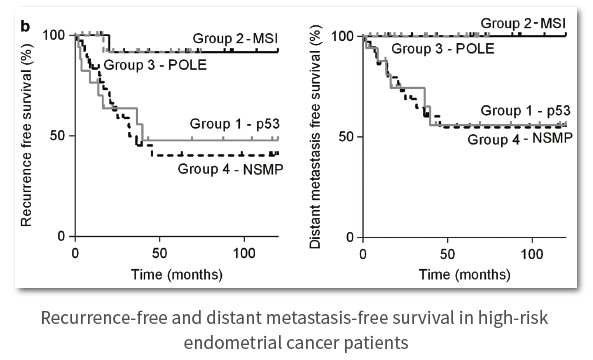
Patients with MSI-H stage II colorectal cancer cannot benefit from fluorouracil single-agent adjuvant chemotherapy, and chemotherapy has greater side effects. Therefore, such patients are not recommended to use fluorouracil (such as 5-FU, capecitabine) single drug adjuvant chemotherapy.
NCCN specifically pointed out that for stage II colon cancer with MSI-H features, poor tissue differentiation is no longer considered a high-risk factor. [3]
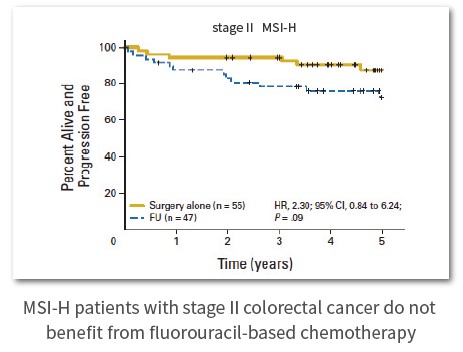
The results of the MAGIC study[6] showed that among patients who only received surgical treatment, the OS of dMMR/MSI-H patients was not reached, while the OS of pMMR/MSI-L/MSS patients was 20.5 months (P value=0.09). Among patients who received surgery and chemotherapy, the OS of dMMR/MSI-H patients was 9.6
months, and the OS of pMMR/MSI-L/MSS patients was 19.5 months (P value = 0.03).
In conclusion, dMMR/MSI-H conferred a positive predictive effect in patients treated with surgery alone, whereas it was associated with a negative predictive effect in patients treated with chemotherapy, therefore, operable dMMR/MSI-H patients do not benefit from perioperative chemotherapy.
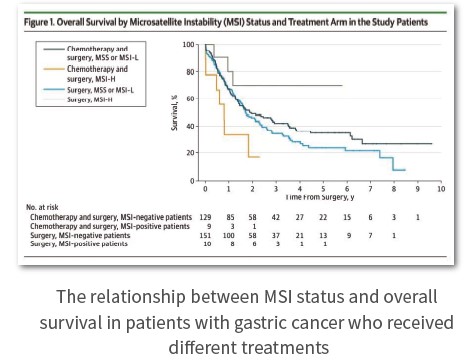
FDA approves Keytruda to treat all solid tumors with MSI-H
Based on the clinical data of 149 MSI-H/dMMR cancer patients, a total of 15 types of cancer, the objective response rate after Keytruda treatment was 39.6%, of which 11 were in complete remission, 48 were in partial remission, and 78% of the patients who responded the curative effect lasts for more than 6 months.

A wide range of tumor types responded, including: colorectal cancer (32 patients), endometrial cancer (5 patients), gastric cancer (5 patients), bile duct cancer (3 patients), pancreatic cancer (5 patients), small bowel cancer (3), breast cancer (2), prostate cancer (1), esophageal cancer (1), small cell lung cancer (1). That is to say, even if the cancer has different onset sites, PD-1 therapy can be tried because of the common characteristics of MSI-H/dMMR.
For MSI detection sites, the NCI recommended sites in 1997 were 2 single nucleotide sites + 3 double nucleotide detection sites [7], subsequent studies have proved that single nucleotide sites have high sensitivity and specificity Sex, and the dinucleotide site is not sensitive to MSI caused by hMSH6 mutation [8]. In view of this, the 2004 revised NCI guidelines recommend single nucleotide sites as MSI detection sites [9].
In August 2019, ESMO released recommendations for MSI detection in cancer immunotherapy [10]. In view of the high sensitivity and specificity of single nucleotide repeat sequence panels, the consensus recommended the use of single nucleotide repeat sequence panels for MSI detection.
The 2019 "Chinese Expert Consensus on Detection of Microsatellite Instability in Colorectal Cancer and Other Related Solid Tumors" [11] pointed out that the combination of 5-7 marker sites based on the Pentaplex panel in the PCR method BAT25, BAT26, NR21, NR22, NR24, NR27 and MONO27 are recognized as the gold standard for PCR.
It can be seen that it is the general trend to use single nucleotide sites as the standard detection of MSI detection.

Compared with the results of multiple fluorescent PCR-capillary electrophoresis and immunohistochemistry, the result consistency rate is higher; while the single nucleotide site panel selected by Microread Genetics is superior in both sensitivity and specificity analysis. In 1997 NCI panel, consistent with literature reports.
At the same time, the DNA of normal tissue and tumor tissue samples of the same individual is extracted, and the detection sites are amplified by multiplex fluorescent PCR;The amplified products are detected by capillary electrophoresis using a gene analyzer, and the results are analyzed by professional software.
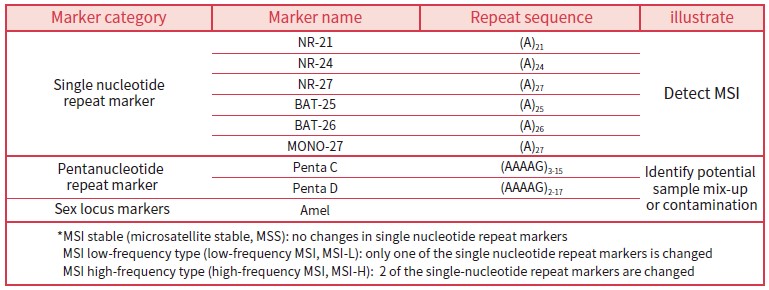
Fluorescent PCR-capillary electrophoresis
Paraffin-embedded tissue section (tumor tissue + paracancerous tissue) Applicable instruments
PCR instrument: Applied Biosystems Veriti/ Veriti Dx/9700/2720, Bio-Rad T100. Gene analyzer: Applied Biosystems 3500 Dx /3500xl Dx, 3500/3500xl, 3130xl; Seqstudio.
Developed the first microsatellite instability gene detection kit in China, and obtained the invention patent in 2012.Patent No.: ZL 2011 1 0152226. X
The revised Bethesda guideline/NCI guideline recommends the use of single nucleotide sites.
In clinical studies of keytruda companion diagnostics, MSI detection uses a single nucleotide site.

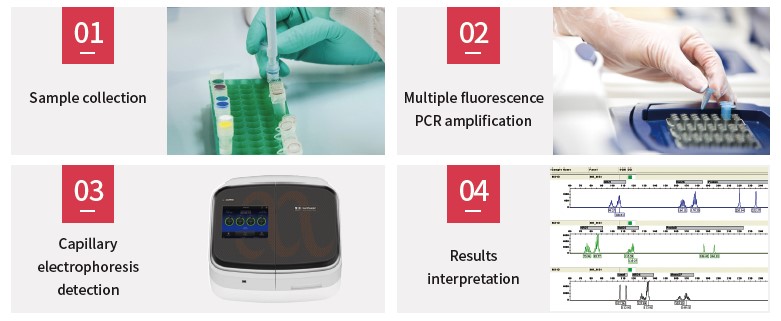

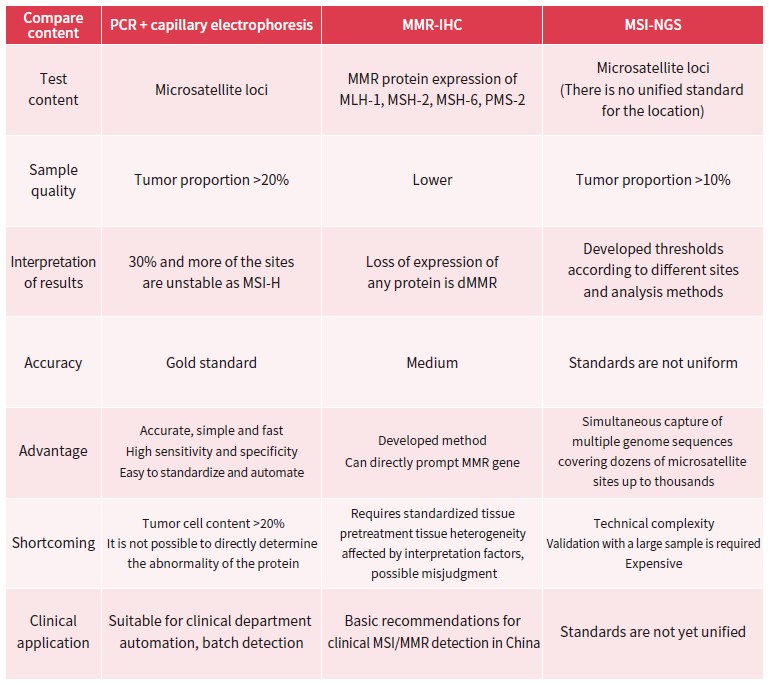
[1] Hause, R. J. , et al. "Classification and characterization of microsatellite instability across 18 cancer types." Nature Medicine 22.11(2016):1241.
[2] "Identification of Lynch syndrome among patients with colorectal cancer. " Jama (2012).
[3] Sargent, D. J., et al. "Defective Mismatch Repair As a Predictive Marker for Lack of Efficacy of Fluorouracil-Based Adjuvant Therapy in Colon Cancer." Journal of Clinical Oncology 28.20(2010):3219-3226.
[4] Wang, Qiang, et al. "Clinical characteristics and prognostic significance of TCGA and ACRG classification in gastric cancer among the Chinese population." Molecular Medicine Reports 22.2(2020).
[5] Stelloo, E., et al. "Refining prognosis and identifying targetable pathways for high-risk endometrial cancer; a TransPORTEC initiative." Modern Pathology.
[6] Smyth, Elizabeth C, et al. "Mismatch Repair Deficiency, Microsatellite Instability, and Survival: An Exploratory Analysis of the Medical Research Council Adjuvant Gastric Infusional Chemotherapy (MAGIC) Trial." Jama Oncology 3.9(2017).
[7] Boland, C. R.. "A National Cancer Institute work-shop on microsatellite instability for cancer detection and familial predisposition: Development of international criteria for the determination of microsatellite instability in colorectal cancer." Cancer Res 58(1998).
[8] Suraweera, Nirosha, et al. "Evaluation of tumor microsatellite instability using five quasimonomorphic mononucleotide repeats and pentaplex PCR." Gastroenterology 123. 6(2002):1804-1811.
[9] Asad, U., et al. "Revised Bethesda Guidelines for Hereditary Nonpolyposis Colorectal Cancer (Lynch Syndrome) and Microsatellite Instability." Journal of the National Cancer Institute 4(2004):936.
[10] Luchini, C., et al. "ESMO recommendations on microsatellite instability testing for immunotherapy in cancer, and its relationship with PD-1/PD-L1 expression and tumour mutational burden: a systematic review-based approach." Annals of Oncology 30.8(2019):1232-1243.
[11] Colorectal Cancer Expert Committee of Chinese Society of Clinical Oncology, Chinese Anticancer Cancer Society Colorectal Cancer Professional Committee Genetics Group, and Chinese Medical Doctor Association Colorectal Cancer Professional Committee Genetics Committee.”Chinese Expert Consensus on Microsatellite Instability Detection of Colorectal Cancer and Other Related Entities." Chinese Journal of Tumor 041.010(2019):734-741.
※ See the manual for details.
[ENG]MSI.pdf:Reference:[ENG]MSI.pdf